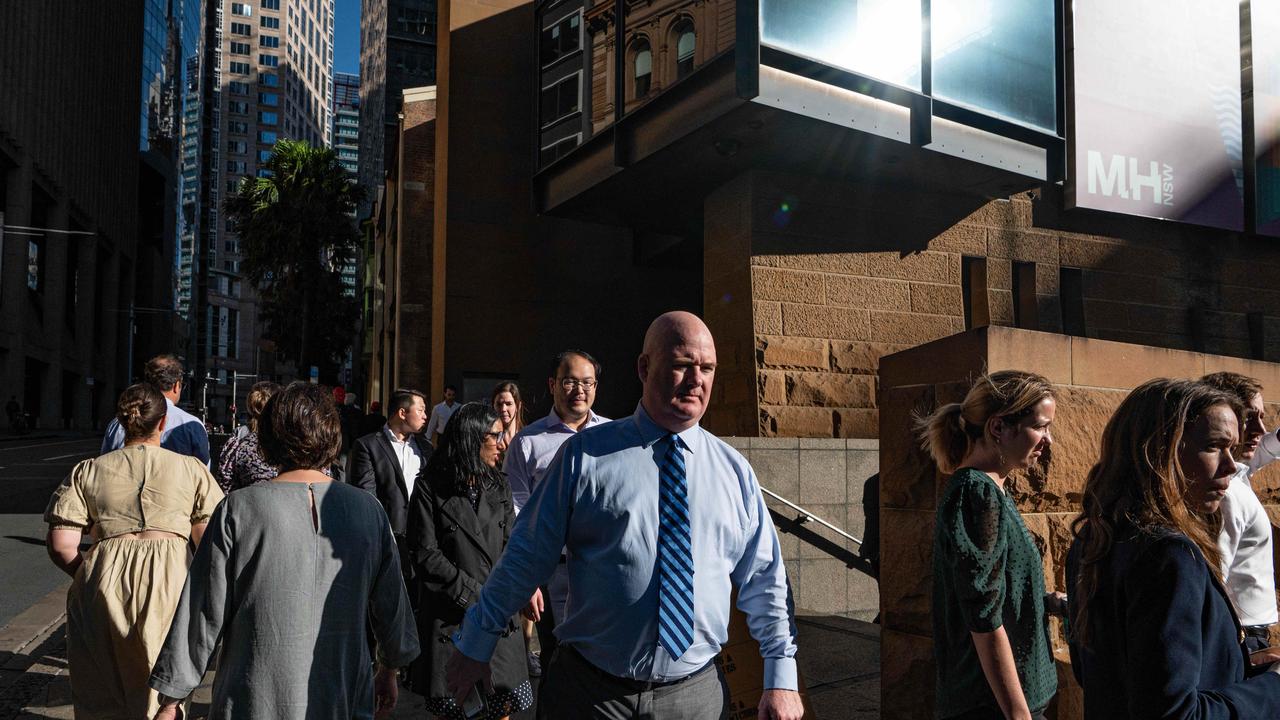What Australian businesses are doing with working from home rules
As the union takes Commonwealth Bank to the Fair Work over its return-to-office order, here are what other businesses are doing when it comes to WFH.
With a battle between the The Finance Sector Union and CommBank over return-to-work rules heads to the Fair Work Commission, the spotlight has swung onto other businesses and their approach to flexible working.
CBA ordered 49,000 of its employees back into the office at least 50 per cent of the time from July 17, leaving many disgruntled after years of Covid-era work-from-home arrangements.
According to the Fair Work Ombudsman (FWO), employees in private companies may be able to refuse to return to work because of a “reasonable concern about their health and safety” or another legitimate reason.
Although in its latest advice on “when employees refuse to return to work or their workplace”, the FWO said an employee can’t refuse an employer’s direction if it is “reasonable” and in line with legal obligations.

However, some of the biggest companies — from banks to accounting firms and supermarket chains — say they will be keeping their work from home policies for now.
Professor David Bissell from the University of Melbourne said the pandemic has sparked a shift to remote or hybrid working, where being at the office full-time from 9am to 5pm is no longer necessary.
But he warned there are “clear ramifications” that come from this full-flexible policy, especially after the public sector agreed on Tuesday to uncapped working from home days .

“In practice a better work-life balance might actually be hard to achieve as working from home can risk ‘presence bleed’, which is the idea that for home workers, work no longer has fixed boundaries,” Prof Bissell said.
“It might also mean that businesses close to CBD offices where public sector workers traditionally work, like cafes, bars, and support services will become less viable.
“This would then potentially make our city centres less attractive places to be, risking them becoming what some people have called ‘doughnut cities’.”
Prof Bissell said there’s also the risk employers might begin offshoring jobs to be done more cheaply outside of Australia.
“It will certainly be sparking a conversation in other non-public sector workplaces, many of which are still in the process of figuring out what the right thing to do is with regard to flexible work,” he said.
“Face-to-face proximity is still massively important for many workplaces, people are tired of spending hours on Zoom, and many workplaces are trying hard to reimagine how the office is used, and what sort of activities should take place there.”
And while Commbank has comes under fire for its policy change, for other big employers working from home is here to stay.
PUBLIC SECTOR JOBS
The Community and Public Sector Union revealed on Tuesday that it had reached an agreement with the Australian Public Service Commission over flexible working arrangements.
Employees will now be able to work as many days per week at home as they wish, with WFH requests only to be refused after “genuinely trying to reach agreement” with the staff member.
The agreement covers 174,000 bureaucrats across 103 agencies.
Telecommunications, call centres, employment services, commercial broadcasting, aviation, and science and research employees will also come under the deal.

ANZ
The big bank said employees working from home have seen great benefits with their hybrid model and stuff are expected to spend half their time in the office.
“ANZ has always embraced flexible working, whether that is where you work or when you work,” an ANZ spokesman said.
“We have long believed there is value in this approach and have found it be a success.
“For some time, we have made clear we expect our people who can work flexibly to spend 50 per cent of their time in the office.”
NAB
Office-based staff are expected to spend a minimum of two to three days a week in the office, while senior leaders are expected in office five days a week.
COMMONWEALTH BANK
From July 17, office-based staff will come into the office for at least 50 per cent of the time.

TELSTRA
The telecom company said they support a hybrid model and there are no mandates on time in the office.
“Our approach continues to support our people to work where, when, and how they are the most engaged and productive,” a spokesman said.
“For many, this is a combination of working from home, from our major hubs, even from a local office or anywhere.
“At Telstra, work is a thing you do not a place you go and we know our people are at their best when they have choice.”
ERNST & YOUNG
Ernst & Young said their focus for employees is about “productivity, client needs and supporting health and wellbeing”.
“EY has always had a hybrid approach to work – our people can work from client sites, remotely, at home or in the office,” a spokesman said.
“We do encourage staff to come into the office two to three days a week as we know this is good for culture, teaming and collaboration, but we do not mandate where they work from.”
DELOITTE
Deloitte’s chief human resources officer Tina McCreery said the company will be keeping their flexible arrangements with no changes in sight towards their policy.
“At Deloitte, we believe in giving our people the freedom to choose where, when and how they work based on the type of work they’re doing,” Ms McCreery said.
“That means no fixed office days or rigid 9-to-5 schedules.
“We won’t be making any changes to these flexible working arrangements so our people can continue to work in a way that makes sense for our clients, their team and them.”
KPMG
The consulting giant has no fixed days for employees to be in the office although it’s largely dependent on the team and client needs.
“Our hybrid working model remains unchanged and offers our people the ability to work flexibly from home, in the office or onsite with clients,” a spokesman said.
“The ability of employees to work within these arrangements is dependent upon a number of considerations including client needs, team leadership and project type.”

MEDIBANK
Medibank group executive people and culture Kylie Bishop said the pandemic has changed the way the company operates when it comes to remote working.
“For Medibank, work is something we do, not somewhere we go. For our head office employees, being in the office Monday to Friday is not our norm,” Ms Bishop said.
“But we also know that not all roles can be done from home, and we encourage and support flexibility in many other ways including flexibility in rosters, hours worked and the opportunity to take leave when our people need it.
“Our focus is on challenging the long-held traditions of the workplace including the traditional working week and what it means for all our people.”
Ms Bishop said Medibank was experimenting with four-day work weeks to “increase flexibility”.
“We‘ve seen during the pandemic that businesses can achieve both the financial outcomes and maintain productivity, but also give people the opportunity to do things that are important in their life,” she said.
“Whether that be the opportunity to pick up kids from school, go to the gym, or prep dinner for the family, there‘s an amazing opportunity that comes from a flexible working environment.
“We think we’ve got the balance right.”
APA GROUP
The company says they require there office-based teams to spend a minimum of 40 per cent of time, over a month, in the office.
“Our teams acknowledge the benefits of collaborating and connecting together physically, which is why APA supports both ways of working,” a spokesman said.
“And there is no doubt that flexible working for people whose jobs allow it is an important part of attracting and retaining talent, particularly in the energy transition as the competition for people continues to grow and intensify across the world.
“As a national energy infrastructure business, more than two thirds of our employees do work in the field – such as our fitters, fabricators and technicians and so on, and simply can’t enjoy this same level of flexibility because their work is critical to the functioning of Australia.
“Ultimately, our number one priority is creating an environment that ensures all our employees are supported, safe, and enjoy coming to work.”
WOOLWORTHS
The supermarket giant hasn’t set a formal requirement for the number of days support office team members are expected to work from the office.
Instead, it’s up to individual teams to determine when employees attend the office.
However, most teams are working two to three days a week in the office.
COLES
Coles has a flexible working policy for team members and it’s up to individual teams to determine when employees attend the office.
‘We have support centres around Australia and have invested in technology to support flexible working for these employees,” a spokesman said.
‘Following the years of Covid-19 lockdowns and restrictions, many of our team members have returned to the support centres for a few days a week to collaborate, attend events and socialise with each other again in person.
“In stores we offer a range of rostering options to help team members balance their work and home life.”

BHP
The mining company supports hybrid working in their offices across Melbourne, Adelaide, Perth and Brisbane.
They also have an updated guidance for people to spend two to three days a week in the office.
REA GROUP
The online real estate company supports hybrid model, with the majority of staff work an average 2-3 days per week in office.
Originally published as What Australian businesses are doing with working from home rules





